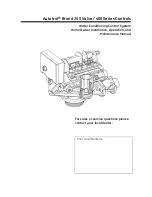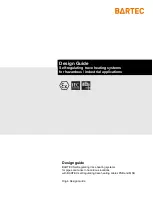
Introduction
18
refers to UTC. The majority of electronic devices with
time and date also continue to use the term GMT. When
setting the correct time zone for the user location, the in-
put/selection is often made by entering the number of
hours by which the local time is ahead of (+) or behind (-)
the standard time (GMT or UTC).
GPRS
General Packet Radio Service
, shortened to
GPRS
,
is the term used to refer to the
packet-based
ser-
vices for transferring data in
GSM
networks.
GSM
Global System for Mobile Communications (previously
Groupe Spéciale Mobile), a standard for fully digital wire-
less mobile networks, mainly used for telephony but also
for line and packet-based data transmission and short
text messages (SMS).
Strictly speaking this is the technologies of the second
generation.
However, it is also used as a generic term for all the gen-
erations, 2G=GSM, 3G=UMTS, 4G=LTE.
GUI
Graphical use interface, the display on the alarm panel
used to program and operate the alarm panel via menu
keys
HTTPS
HyperText Transfer Protocol Secure, a communications
protocol on the web, used to transfer data securely.
HTTPS is used online to establish confidentiality and in-
tegrity in communications between web server and web
browsers (clients). This is achieved through encryption
and authentication.
Without encryption, data transmitted over the internet can
be read as plain text by anyone who has access to the
corresponding network.
IAD
An
Integrated Access Device
(or router) is a device
used for the
network connection
of
NGN
ports by the
participant
.
IMEI
International Mobile Station Equipment Identity (IMEI), a
unique 15-digit serial number that can be used to
uniquely identify each wireless mobile end device.
IMSI
International Mobile Subscriber Identity (IMSI), used in
wireless mobile networks to uniquely identify network
subscribers (internal subscriber identification). In addition
to other data, the IMSI is saved on a special chip card
known as a SIM (Subscriber Identity Module). The IMSI
number is uniquely assigned worldwide to each customer
by the wireless mobile network operators. The IMSI has
nothing to do with the telephone number assigned to the
SIM card.
Indoor sounder
Signal generator for indoor use, visual/acoustic sounder
(in addition to outdoor sirens)
Indoor siren
Sounder for indoor use, usually a purely acoustic
sounder (in addition to outdoor sirens).
Interior protection
The indoor area of the premises is protected here, espe-
cially areas that an intruder most likely has to enter; mo-
tion detectors and light barriers are usually used here.
Installation
Mounting of the alarm panel and components, including
commissioning.
Internal alarm
Alarm sounds only within the building. The outdoor sirens
do not sound.
Intuitive operation
Easy operation of a device using a menu that is logical
from the point of view of the user.
Summary of Contents for SECVEST FUAA50 Series
Page 12: ...Device overview 12 International key assignment...
Page 39: ...Configuration 39 Communication...
Page 46: ...Configuration 46 Components Teach in via web interface...
Page 74: ...Configuration 74 Outputs...
Page 85: ...Configuration 85 1 Select menu item Type...
Page 94: ...Configuration 94...
Page 111: ...Configuration 111 System...
Page 148: ...Configuration 148 Communication Network...
Page 157: ...Configuration 157 ARC reporting...
Page 159: ...Configuration 159...
Page 177: ...Configuration 177 Voice dialler S W 3 00 05...
Page 185: ...Configuration 185...
Page 216: ...Configuration 216...
Page 229: ...Configuration 229 Log S W v2 01 08...
Page 278: ...Appendix 278...
Page 326: ......
















































